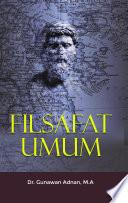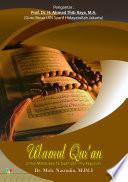Judul : Pendidikan Pancasila Penulis : KBP (Purn.) Dr. H. Yusuf Setyadi, SH., SStMk, MM, M. Hum & Dr. Abdul Aziz, M. Ag Ukuran : 15,5 x 23 cm Tebal : 300 Halaman Cover : Soft Cover No. ISBN : 978-623-162-697-4 No. E-ISBN : 978-623-162-702-5 (PDF) SINOPSIS Indonesia adalah negara terbesar di kawasan Asia Tenggara, dan terbesar nomor tiga di kawasan Asia, serta penduduknya mayoritas Muslim nomor wahid. Akan tetapi dalam penyelenggaraan ketatanegaraannya tidak menganut sistem ideologi keagamaan tertentu melainkan Pancasila sebagai satu-satunya ideologi bangsa dan negara yang harus ditaati oleh seluruh warga negaranya. Di samping sebagai satu-satunya ideologi bangsa dan negara, Pancasila juga menjadi falsafah pandangan hidup bagi kehidupan berbangsa dan bernegara. Kesepakatan satu-satunya Ideologi negara Indonesia ini tidak lepas dari peran besar para pendiri bangsa di awal kemerdekaannya dengan lapisan masyarakat dari Sabang sampai Merauke, terutama peran para Ulama, Kyai, dan tokoh masyarakatnya. Secara historis, Pancasila yang lahir 1 Juni 1945 dan ditetapkan sebagai satu-satunya ideologi negara dan bangsa Indonesia pada 18 Agustus 1945 sampai saat ini telah matang dalam merangkai kebineka tunggal ika-an sebagai wujud pemersatu rakyat Indonesia, meskipun tentu masih perlu diperkuat secara sistemik demi terus menjadi inspirasi dan motivasi masyarakat bangsa dan negara beserta seluruh warga-negaranya memegang teguh keyakinannya dalam berkehidupan berbangsa dan bernegara. Untuk itu maka Pancasila perlu disosialisasikan, dipahamkan dan hayati serta amalkan secara terus menerus kepada segenap lapisan anak bangsa dari generasi ke generasi sehingga tidak ada lagi yang ingin merubah ideologi ini pada ideologi lain, baik ideologi ke kiri-kirian maupun ke kanan-kananan. Meskipun tak terbantahkan bahwa dalam perjalanan panjang sejarah sejak awal kemerdekaannya sampai era melineal, Ideologi Pancasila mengalami hiruk pikuk ide gagasan yang ingin mencoba untuk merubahnya – akibat menguatknya ideologi lain, seperti Komunis dan Liberalis – namun dengan keteguhan keyakinan para tokoh agama, masyarakat dan tentu Pemerintah, Pancasila tetap eksis. Oleh karena itu, salah satu cara agar Pancasila betul-betul dapat dipahami dan hayati segenap lapisan masyarakat, terutama generasi mudanya wajib untuk mengetahui ideologi yang satu ini sejak dini.
-
ISBN 13 : 6231626970
-
ISBN 10 : 9786231626974
-
Judul : Pendidikan Pancasila
-
Pengarang :
KBP (Purn.) Dr. H. Yusuf Setyadi,
SH.,
SStMk,
MM,
M. Hum,
Dr. Abdul Aziz,
M. Ag,
SH.,
SStMk,
MM,
M. Hum,
Dr. Abdul Aziz,
M. Ag,
SH.,
SStMk,
MM,
M. Hum,
Dr. Abdul Aziz,
M. Ag,
SH.,
SStMk,
MM,
M. Hum,
Dr. Abdul Aziz,
M. Ag,
SH.,
SStMk,
MM,
M. Hum,
Dr. Abdul Aziz,
M. Ag,
SH.,
SStMk,
MM,
M. Hum,
Dr. Abdul Aziz,
M. Ag,
SH.,
SStMk,
MM,
M. Hum,
Dr. Abdul Aziz,
M. Ag,
SH.,
SStMk,
MM,
M. Hum,
Dr. Abdul Aziz,
M. Ag,
SH.,
SStMk,
MM,
M. Hum,
Dr. Abdul Aziz,
M. Ag,
SH.,
SStMk,
MM,
M. Hum,
Dr. Abdul Aziz,
M. Ag,
SH.,
SStMk,
MM,
M. Hum,
Dr. Abdul Aziz,
M. Ag,
SH.,
SStMk,
MM,
M. Hum,
Dr. Abdul Aziz,
M. Ag,
SH.,
SStMk,
MM,
M. Hum,
Dr. Abdul Aziz,
M. Ag,
SH.,
SStMk,
MM,
M. Hum,
Dr. Abdul Aziz,
M. Ag,
SH.,
SStMk,
MM,
M. Hum,
Dr. Abdul Aziz,
M. Ag,
SH.,
SStMk,
MM,
M. Hum,
Dr. Abdul Aziz,
M. Ag,
SH.,
SStMk,
MM,
M. Hum,
Dr. Abdul Aziz,
M. Ag,
SH.,
SStMk,
MM,
M. Hum,
Dr. Abdul Aziz,
M. Ag,
SH.,
SStMk,
MM,
M. Hum,
Dr. Abdul Aziz,
M. Ag,
SH.,
SStMk,
MM,
M. Hum,
Dr. Abdul Aziz,
M. Ag,
SH.,
SStMk,
MM,
M. Hum,
Dr. Abdul Aziz,
M. Ag,
SH.,
SStMk,
MM,
M. Hum,
Dr. Abdul Aziz,
M. Ag,
SH.,
SStMk,
MM,
M. Hum,
Dr. Abdul Aziz,
M. Ag,
SH.,
SStMk,
MM,
M. Hum,
Dr. Abdul Aziz,
M. Ag,
SH.,
SStMk,
MM,
M. Hum,
Dr. Abdul Aziz,
M. Ag,
SH.,
SStMk,
MM,
M. Hum,
Dr. Abdul Aziz,
M. Ag,
SH.,
SStMk,
MM,
M. Hum,
Dr. Abdul Aziz,
M. Ag,
SH.,
SStMk,
MM,
M. Hum,
Dr. Abdul Aziz,
M. Ag,
SH.,
SStMk,
MM,
M. Hum,
Dr. Abdul Aziz,
M. Ag,
SH.,
SStMk,
MM,
M. Hum,
Dr. Abdul Aziz,
M. Ag,
SH.,
SStMk,
MM,
M. Hum,
Dr. Abdul Aziz,
M. Ag,
SH.,
SStMk,
MM,
M. Hum,
Dr. Abdul Aziz,
M. Ag,
SH.,
SStMk,
MM,
M. Hum,
Dr. Abdul Aziz,
M. Ag,
SH.,
SStMk,
MM,
M. Hum,
Dr. Abdul Aziz,
M. Ag,
SH.,
SStMk,
MM,
M. Hum,
Dr. Abdul Aziz,
M. Ag,
-
Kategori : Education
-
Penerbit : Penerbit Adab
-
Bahasa : id
-
Halaman : 300
-
Google Book : https://play.google.com/store/books/details?id=glL3EAAAQBAJ&source=gbs_api
-
Ketersediaan :
Judul : Pendidikan Pancasila Penulis : KBP (Purn.) Dr. H. Yusuf Setyadi, SH., SStMk, MM, M. Hum & Dr. Abdul Aziz, M. Ag Ukuran : 15,5 x 23 cm Tebal : 300 Halaman Cover : Soft Cover No. ISBN : 978-623-162-697-4 No. E-ISBN : 978-623-162-702-5 ...










